
I first met C.W. Mundy when I stepped into the back of a limousine one evening in Cincinnati. We were participating artists in the Great American Artists Show and were being transported to the show venue.If you know anything about C.W., you know he is not shy. An outspoken Christian, it was not long before we discovered our common faith. I admire his authentic boldness and fearlessness, and it seems to permeate every area of his life including his work.

36″x 24″ – Oil – 20122nd Place, Masters Division, 22nd Annual OPA National Competition
His painting has gone through a continuous evolution. Always experimenting, never content to rest on his past successes, he is a bundle of energy, continually looking for new challenges. If it’s not painting, it’s music. If it’s not music it’s something else. He’s not one to sit around wasting time.
He just won second place in the Master Division at the 22nd Annual Oil Painters of America National Competition in Fredericksburg, TX., yet on the drive home to Indiana with his wife, Rebecca, he took the time to answer my questions for this interview…just another example of an active mind making every second count.
I’m very pleased to bring you this wonderful interview with Charles Warren Mundy:
As I’ve watched your work over the years, it seems you are always experimenting…trying new things. Are you fearless about experimentation? I’ve always been fearless to experiment because for me it is necessary to have a challenge, otherwise I’d be bored. The quest is the search.
It seems you paint anything and everything, is there any subject you shy away from? You won’t find me painting little kittens with a ball of yarn!…On the other hand, who knows, I might just do that sometime.
There is a certain unpredictability to your work, not in a negative sense, but in that one is never absolutely sure what you’re going to paint next…or how you’re going to paint it. How do galleries and collectors feel about that? I’ve done this from the beginning, so my collectors and my galleries are actually used to it.
What do you see as the future direction of your work? My future direction – more experimentation! Especially right now, I’m experimenting in the area of “paint manipulation”. There’s a multitude of ways that one can make a mark on linen. I’ve figured out that since these things are called “paintings”, the paint expression is very important!
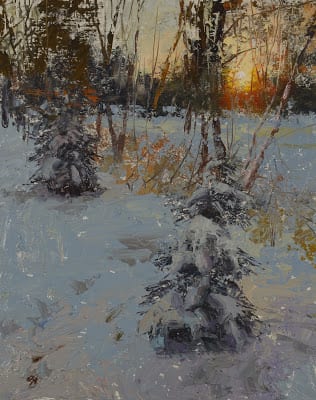
How do your Christian beliefs affect and direct your art career? My wife and I pray about everything! This has directed us in every facet of the career, from conceptualizing, in painting, and in the business aspects.
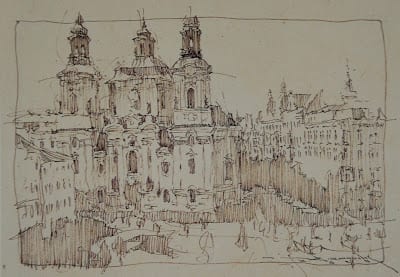
I consider you to be a pretty savvy marketer of your work, please explain your strategy. What has been your most effective marketing tool? Taking the leap of faith from answered prayers. (Psalm 32:8)
Early in the career, for 10-15 years, I did much advertising. That’s how I became known in the industry. Currently I use social media, newsletters, exhibitions, website, blog, trying to stay in front of people. You must continually remind people. A quote I’m known for…”It’s one thing to launch your career, it’s another thing to sustain it”.
How do you balance market expectations and artistic growth? I’m more concerned with artistic growth. My galleries allow this and don’t place high expectations on me.
You are heavily involved in music, and for a time, sports. How have these contributed to your ability to succeed as an artist? I’ve always worked hard to achieve my goals, in sports, music, and in art. There’s no substitute for hard work!
The relationship of painting to music is frequently made, could you explain what is meant by that? There are many parallels between art and music. Here are just a few examples:
There must be unity and variety in correct proportions. In music and in art, if everything’s too unified, it’s boring. Too much variety, and it’s fractured. You want to have as much variety as possible, but still have it unified.
You must have an “attitude” about your work.
In music as well as art, you must have a “centrality of focus”. With music, the centrality is in the lyrics of the chorus. Just as in a painting, it’s where you want your viewers (or listeners) to have a resolve or anchor in your composition. The musical verses have to point to the chorus. In art, the secondary and tertiary areas have to support and not challenge the centrality of focus in the painting.
The dynamics of when to be loud and when to be quiet.
There are music notes and color notes – how do you want them to play out or speak?
Why did you select art over music as your career? I was in a great 5-piece band in L.A. in the late 1970′s. We wrote all our own music, and were getting ready to record with a major music recording company, when one band member became very sick and then passed away, and the band dissolved. Our dream ended and I was dejected, not only at the loss of our friend, but because of the investment of time and effort for the band. I felt that God really spoke to me at that time and told me to go back to art and painting, where I didn’t need to rely on other people to make a living, just my own hard work.
Why, at this time, is there such a move in America toward realism…even the classic kind? The pendulum swings! The American Impressionism of the last several decades has had a good run, but that continues as well.
How do you decide on a dominating color key for a painting, and how do you maintain it? If you’re concerned with color as opposed to tonality, one might take advantage of playing up complementaries. There is a reason why colors have their complementary. In the history of art, the greatest colorists had a sophisticated usage of color and chroma. Painting straight out of the tube is OK for modernists, but to me it’s like “finger nails on a chalkboard”.
What part does photography play in your work? When subjects move and it’s your only option. Sometimes as well, it’s very advantageous to record spots where you can’t be around such as Europe or other travel destinations, although 90% of all my European Collections of paintings were painted en plein air. If I have to paint from a photograph, I often paint it “upside down” which is much more right brain and creative and helps me stay out of the mode of just painting “things”.
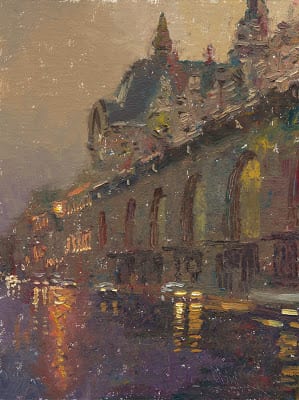
What are the key points one needs to know when creating a true sense of atmosphere? It mostly really boils down to “edges” and being very careful with color notes. In a landscape, many times in the distant trees and distant hillsides, I add more sky color into those masses. Value as well has to be adjusted from the literalness of the scene.
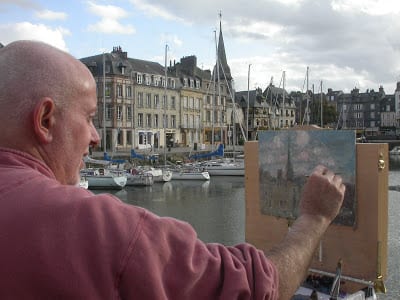
What are the main problems encountered when translating a field study to a large studio work? The loss of the human spirited endeavor and the inability to make large masses interesting and exciting with paint manipulation…are starter problems. The problem continues on when unnecessary details are added. Less is always more!
Do you have basic rules of composition that you adhere to? Almost always I go for the exploitation of a centrality of focus, what I call a “resolve” or an “anchor”. I gravitate toward compositions that have a strong primary, a supporting secondary and supporting tertiary. The Equalization theory which is the exact opposite invented by the modernists was to exploit the eye floating randomly everywhere in the composition with no “resolve” or “anchor”.
How does your work reflect your personality? I’m a charismatic person and I’m too old to have any interest in rendering anymore. I’ve grown into becoming a child trapped in an adult body. I’m like a child wanting to experience things that I’ve never experienced.
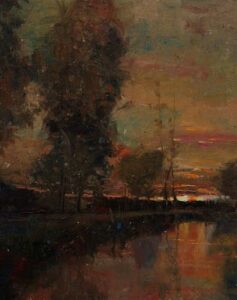
What is your major consideration when composing a painting? First of all, composition rules over all the other tenets in painting. You can do a great job with value, color, edges and paint manipulation, but if the composition is not good, the painting will still “circle the drain”. Your composition will support and explain your love for the subject.
I hate formula painting; it’s the death of an artist. So each experiment in composition in many ways is unique to itself. In a series however, the variables in composition are more consistent for research purposes only. Doing an experiment is different from doing experiments.
What advice would you have for a young artist/painter? You have to become a painter and understand the “science” of painting before you graduate to becoming an artist. Study, hard work! There’s no substitute for mileage.
What advice would you have for a first-time collector? If you really love a painting and can afford it, you’d better purchase it! It only takes one or two regrets to learn your lesson.
When you become discouraged and feel the well is dry, so to speak, what do you do? The first and most important question you need to ask yourself is “why is the well dry?” The second question is “Would it be more productive to work through this or take a break and get a fresh start”.
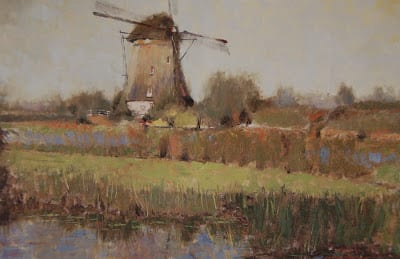
If you could spend the day with any three artist, past or present, who would they be? Rembrandt, Michelangelo, and DaVinci.
If you were stranded on an island, which three books would you want with you? The Bible, a Hebrew concordance and a Greek concordance!
What’s your opinion of art competitions and how do you go about selecting paintings for these shows? Art competitions are only relative to the judge and shouldn’t be taken too seriously by the participant. These competitions have probably destroyed the enthusiasm of the participants in the same proportion to the careers they have resurrected. My selections for shows…Find an artist who is very experienced and has your best interest at heart, and allow him or her to be more objective concerning your entry.
Who has had the greatest influence on your career, and why? To say one who has had the greatest influence would be very misleading and not include the many who have inspired me. It’s always a compilation of many.
Thank you C.W. for a very interesting interview. We’re going to look forward to all those interesting places your continual experimentation with paint will take you.
Mr. Mundy is a Master Signature Member of Oil Painters of America, the American Impressionist Society,and a Signature Member of the American Society of Marine Artists. He is also a member of the Disco Mountain Boys, an Indianapolis based bluegrass band. They just released their debut CD, Road Trip.
Further Reading: view Charles Warren Mundy’s website
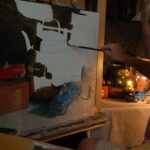
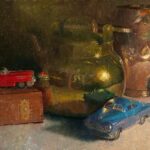
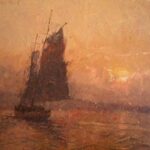
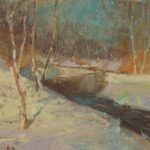
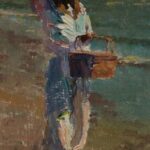
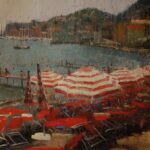
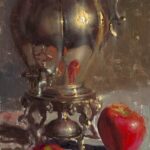
joyce snyder says
Having been a student of yours once I appreciate these words even more. Your obvious love of God and joy of spirit show in word and action. Just wish there was room in your luggage to sit at your feet and continue to learn. God Bless